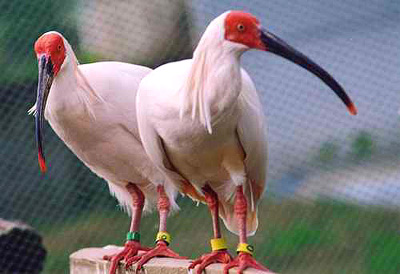| Tools: Save | Print | " target="_blank" class="style1">E-mail | Most Read |
| Ibis Goodwill Gift on the Wings |
| Adjust font size: |
|
The world's most endangered bird species, the crested ibis, may again become a symbol of goodwill for China and Japan this year.
A Yomiuri Shimbun report said China may send crested ibises to Japan as gifts to help the species populate and to warm up bilateral ties. The bird, which is widely treasured in Japan, was sent from China in the 1980s and 1990s.
Although no confirmation is available from the Chinese authority, some conservation experts said the move would help the healthy development of the bird's population in both countries.
The bird used to be found throughout Japan, China, the Korean Peninsula and Russia. The former Soviet Union saw its last crested ibis in 1963, while the Korean Peninsula said goodbye to it in 1978.
Japan captured its last four crested ibises from the wild in 1981 and put them together with a single ibis being kept in captivity. Their only offspring, born in 1995, died in October 2003, leaving Japan with only the ibises sent by China. That year the World Nature Preservation Alliance put it on the "End List," meaning it became one of the world's most endangered and treasured species.
Japan sought help from China immediately after it found in May 1981 seven ibises living in the wild in Yangxian County, Shaanxi Province, 17 years after the bird was deemed extinct in China.
The two countries signed an agreement to jointly protect the species early in 1985. In October that year, the first Chinese ibis, Hua Hua, was flown to Japan.
Another pair, Long Long and Feng Feng, were sent to Japan in September 1994, carrying with them the hope of both countries that they could start a family there by the end of their three-year stay. But Long Long died suddenly on December 13, 1994 and Feng Feng was sent back to China the following year.
Another pair, You You and Yang Yang, were sent to Japan as gifts in November 1998 when then President Jiang Zemin visited Japan. The birth of their first chick, You You, at a Japanese breeding center in May 1999, marked the beginning of a thriving family, which Yomiuri Shimbun said now numbers 97.
"All of the crested ibises living in captivity in Japan are actually descendants of the birds sent by the Chinese government," Ding Changqing, an ornithologist with the Zoology Institute of the Chinese Academy of Sciences, told China Daily. "More ibises from our country will certainly help keep their birds from becoming too inbred."
There are currently more than 500 crested ibises living in the wild, said Yuan Wei, chief engineer of the Shaanxi Wild Animal Protection Station.
He said 418 crested ibises were living in the country's two breeding centers.
(China Daily January 20, 2007) |
| Tools: Save | Print | " target="_blank" class="style1">E-mail | Most Read |
 |
| Related Stories |
|
|


